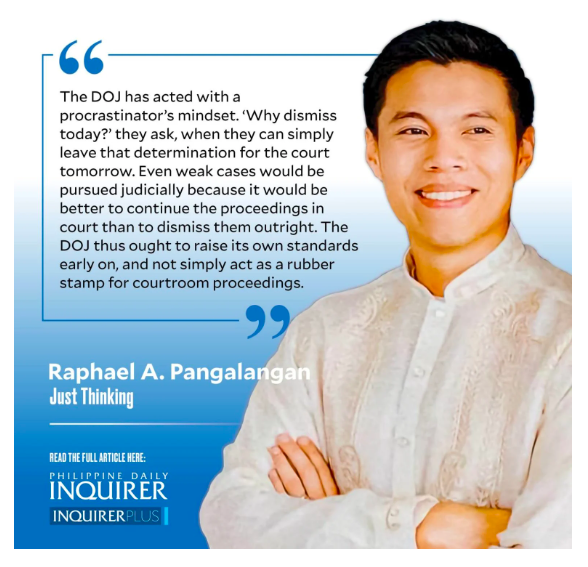
On Feb. 10 2023, Secretary of Justice Jesus Crispin Remulla issued Department of Justice (DOJ) Circular No. 008 directing all prosecutors handling M-level criminal cases to determine the certainty of success. The circular reads: “If, upon assessment by the handling prosecutor, it is determined that there is no such reasonable certainty of conviction, the said handling prosecutor is ordered to immediately file the proper motion to withdraw the information.”
Now, contrary to what some lawyers might say, the law is the furthest thing from Gospel truth. Doctrine is not divine. It is not canonized, but simply codified. Not ordained, only orated. The law is man-made and—in being so—it is flawed.
That imperfect nature of law is built into our legal order. It is not solely adopted or admitted. Much more: It is accepted. And that integration of imperfection is most clearly illustrated through the law on evidence.
There is not a legal system out there that adopts “Gospel truth” as an evidentiary standard. Indeed, the Philippine Supreme Court itself has time and again pronounced how it is not “absolute certainty” they seek but only “moral certainty,” that is, the “that degree of proof which produces conviction in an unprejudiced mind.” That through which the “conscience must be satisfied that the accused is responsible for the offense charged.” (Daayata v. People, G.R. No. 205745, and Rules of Court 133(2))
Now, to the technocrats in the room, it may appear as if “moral certainty” is only required for criminal cases. After all, Daayata and the rules aforecited speak of “conviction” and “offenses” that are “charged”—the jargon of criminal law. Respectfully, I beg to disagree.
To be “morally certain” is certainly not a requirement of any one field of law. Indeed, to take jurisprudence literally would likely lead to baffling results. To a universe where civil litigators, commercial practitioners, and the arbitrators and judges before whom they advocate would be able to act with “immoral” certainty. (A universe, perhaps, that is not all that different from ours today.)
Moral ascertainment, therefore, is a requirement for all fields of law. The confusion, however, lies in the fact that what is moral for one field will differ for the purposes of another. “Moral certainty” should thus be thought of as a shape-shifting standard of sorts. One that adapts to the contours and pressures of the particular legal regime.
For the purposes of administrative cases, legal truth is “deemed established if it is supported by substantial evidence, or that amount of relevant evidence which a reasonable mind might accept as adequate to justify a conclusion.” (Rule 133(5)). For civil cases, the standard is raised from substantial to a preponderance of evidence. Courts thus subscribe to the equipoise principle and rule in favor of the “evidence which is of greater weight.” (Rule 133(1))
The highest of the evidentiary standards is that in criminal proceedings: proof beyond reasonable doubt—as already defined by Daayata above. The reason for this higher hurdle is the consequence that hinges upon the judicial determination. Unlike administrative and civil liability, in criminal cases, life*, liberty, and property may be deprived with due process of law. (*The deprivation of life—via the death penalty—has since been prohibited in the Philippines via Republic Act No. 9346.) The sanction determines the standard.
But for the purposes of the DOJ, the standard has always been much lower. When deciding on whether to pursue a case to begin with, the prosecution must simply find “probable cause,” that is, “such facts and circumstances as would excite the belief in a reasonable mind that a crime has been committed and the respondent is probably guilty of the crime” (De Ocampo v. Secretary of Justice, G.R. No. 147932). Through DOJ Circular No. 008, however, Remulla has taken a stricter interpretation of what probable cause entails.
While the “reasonable certainty of conviction” may sound like an unreasonably high threshold, I for one agree with this latest move. The circular is a much-needed attempt to lighten the dockets of prosecutors and courtrooms alike. What strikes me strange, however, is why this move is made only with regard to cases already pending before the Municipal Trial Courts (i.e., the judicial stage).
The DOJ ought to have taken a page from Japan’s prosecutorial textbook and apply this higher threshold earlier on during the preliminary investigation (i.e., the executive stage). You see, in contrast to the Philippines’ dismal 25 percent success of conviction rating, Japan has a batting average of 99.95 percent—partly explained by the fact that prosecutors would only ever pursue cases where guilt is clear prima facie—most often, through the vehicle of extrajudicial confession. While the Japanese prosecutorial style is far from perfect—and, indeed, it has been the subject of criticisms in terms of selective justice and forced confessions, among others—nonetheless, lessons may be drawn for the purposes of a legal system that is hobbled by the sheer mass of pending cases.
The DOJ has acted with a procrastinator’s mindset. “Why dismiss today?” they ask, when they can simply leave that determination for the court tomorrow. Even weak cases would be pursued judicially because it would be better to continue the proceedings in court than to dismiss them outright. The DOJ thus ought to raise its own standards early on, and not simply act as a rubber stamp for courtroom proceedings.
Quickly: Now one might argue that the power to reinterpret “probable cause” belongs not to the DOJ but to the Supreme Court. After all, Rule 112 provides for the procedure on preliminary investigation. This argument is misplaced. The bedrock doctrine of the separation of powers would, in fact, show that the DOJ’s determination of probable cause is an executive act and, thus, is to be defined by executive will.
—————–
thinkjustly@gmail.com

